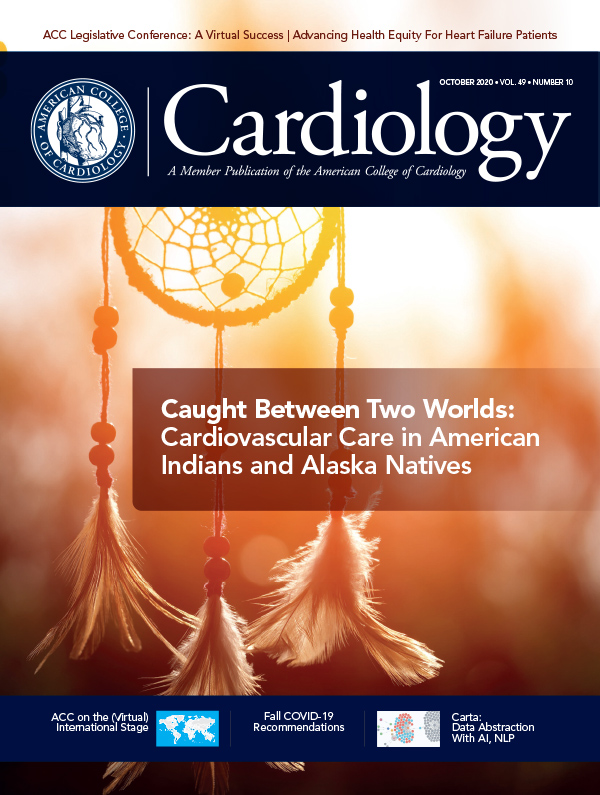Journal Wrap

The hottest research from various peer-reviewed journals – handpicked weekly by the ACC.org Editorial Board led by Kim A. Eagle, MD, MACC.
NCDR Participation Improved Quality, Lower Costs Outside U.S.
Participation in the NCDR clinical registries may be associated with improved quality and lower costs at hospitals outside the U.S., according to a study published in Clinics.
Pedro Gabriel Melo de Barros, MD, et al., compared records of patients with acute myocardial infarction (AMI) admitted to 10 Brazilian hospitals between 2013 and 2015. The reference hospital was a private general hospital participating in ACC's CathPCI Registry and Chest Pain – MI Registry. The nine other hospitals were private general hospitals located in the same city and were not participating in NCDR.
The researchers evaluated patient records for costs, diagnostic codes and procedure codes. Also they looked at readmission risk, readmission cost, length of stay (LOS) and procedure-based in-hospital costs.
There were 1,663 admissions among 1,610 patients. Overall, medical cost inflation was higher than the annual cost trend at the reference hospital. At the beginning of the study period, costs were similar at the reference hospital and comparison hospitals; however, there was a trend toward lower costs at the reference hospital by the end of the study period.
At the reference vs. the comparison hospitals, the readmission rate was 11.5% vs. 14.5% and average LOS was 4.6±3.6 days vs. 6.2±4.8 days. LOS decreased only at the reference hospital. According to the researchers, the use of NCDR clinical registries to guide quality improvement outside the U.S. was associated with improvement in quality metrics and lower costs. The findings reinforce the need on both quality and cost to "identify the interventions with the best value in current medical practice," they conclude.
Barrros P, Li J, Tremblay C, et al. Clinics 75, e1708.
Arrhythmic Safety of HCQ in COVID-19 Patients Assessed in Real-World Study
A multicenter, prospective study conducted in Europe to assess ECG changes and arrhythmias in COVID-19 patients treated with hydroxychloroquine (HCQ) in different clinical settings found that short-term treatment with the drug, alone or in combination with other QT-prolonging drugs, was associated with only modest QTc prolongation and no directly attributable arrhythmic deaths. The findings were published in EP Europace.
Serial ECG recordings at 36-72 hours and later than 96 hours after treatment onset were able to detect QTc changes that might suggest therapy modification.
A total of 649 patients positive for COVID-19 and treated with HCQ were enrolled from seven institutions between March 10 and April 10, 2020. All enrolled patients had a baseline and at least one ECG at 48 hours. The mean age was 61.9 years and 299 (46.1%) were male. The most common presentation symptoms were fever, dry cough and dyspnea.
A Tisdale score, which assesses the risk of QT prolongation, was determined for each patient at baseline; 55.5% were at low risk and 38.5% at moderate risk. The patients selected for home treatment had mild respiratory symptoms and 88.1% had a low arrhythmic risk.
A QTc prolongation >60 ms was considered abnormal, requiring reassessment of the patient's medical status and drug administration/interactions. HCQ suspension was mandatory for a QTc >550 ms, but suspension for shorter values based on clinical judgement was also performed.
HCQ therapy (200 mg twice daily) was administered at home in 126 (19.4%) patients, in the hospital medical ward in 495 (76.3%) patients, and in the intensive care unit in 28 (4.3%) patients. On the first day, 58.6% of patients took a loading dose of HCQ (400 mg twice). Overall, 53.8% of patients took HCQ alone, 30% received two QT-prolonging drugs, and 13.6% received three.
An ECG was obtained in 358 patients at 36-72 hours after starting HCQ and in 404 patients after 96 hours.
A significant QT/QTc interval prolongation was observed (p<0.001), but the magnitude of the increase was modest (+13 [9-16] ms). Baseline QT/QTc length and presence of fever (p=0.001) at admission were the most important determinants of QT/QTc prolongation.
Over a median follow-up of 16 days, no arrhythmia-related deaths were reported. The overall major ventricular arrhythmia rate was low (1.1%), and centralized event evaluation determined none were related to QT or HCQ therapy.
No differences in QT/QTc prolongation and QT-related arrhythmias were observed across different clinical settings, with non–QT-related arrhythmias being more common in the intensive care setting. The authors, led by Alessio Gasperetti, MD, write, "[p]rovided that an adequate ECG monitoring strategy is implemented, the short-term HCQ treatment used in COVID-19 patients seems to be safe, regardless of the clinical setting in which it is started."
While noting the limitations of their study, including the lack of routinely available 24-hour telemetry and loop recorders for all enrolling centers and variation in the HCQ dose across hospitals, they write this experience provides a framework to enable HCQ therapy implementation in different clinical settings for future efficacy trials.
"Previous studies have also suggested that hydroxychloroquine was relatively safe when given alone, but when combined with azithromycin, which can also lengthen the QT interval, the combination can lead to rare but life-threatening arrhythmias," notes Kim A. Eagle, MD, MACC, editor-in-chief of ACC.org.
Gasperetti A, Biffi M, Duru F, et al. EP Europace 2020;Sept. 24:[Epub ahead of print].
Many Widely Used Medications Cause or Exacerbate Arrhythmias
A variety of arrhythmias may be caused or worsened by many widely used medications from numerous therapeutic classes including antiarrhythmatic agents, antimicrobial drugs, psychotropic medications, methadone, neurological agents, anticancer drugs and others, according to a scientific statement from the American Heart Association published in Circulation.
James E. Tisdale, PharmD, et al., sought to review drugs that cause or exacerbate arrhythmias, consider risk factors, discuss monitoring strategies, describe methods for prevention and risk reduction, and review treatment options.
In the statement, the authors discuss drug-induced bradyarrhythmias, drug-induced supraventricular arrhythmias (atrial fibrillation and atrial flutter, atrial tachycardia, and atrioventricular nodal reentrant tachycardia) and drug-induced ventricular arrhythmias (monomorphic ventricular tachycardia, Brugada syndrome, torsades de pointes and QT interval shortening).
Risk factors are well defined for some drug-induced arrhythmias, but the authors highlight the importance of modifying risk factors when possible for prevention and risk reduction. "In patients with nonmodifiable risk factors who require a potentially arrhythmia-inducing drug, enhanced electrocardiographic and other monitoring strategies may be beneficial for early detection and treatment," write the authors.
"Much remains unknown about the mechanisms of arrhythmias associated with specific drugs," according to the statement. "Further research is needed to better define the overall incidence of specific drug-induced arrhythmias, the underlying mechanisms, and the optimal methods to reduce risk and to increase awareness among clinicians and patients. Consideration of the possibility that a patient's arrhythmia could be drug-induced is important."
Tisdale JE, Chung MK, Campbell KB, et al. Circulation 2020;142:e000–e000.
Keywords: ACC Publications, Cardiology Magazine

